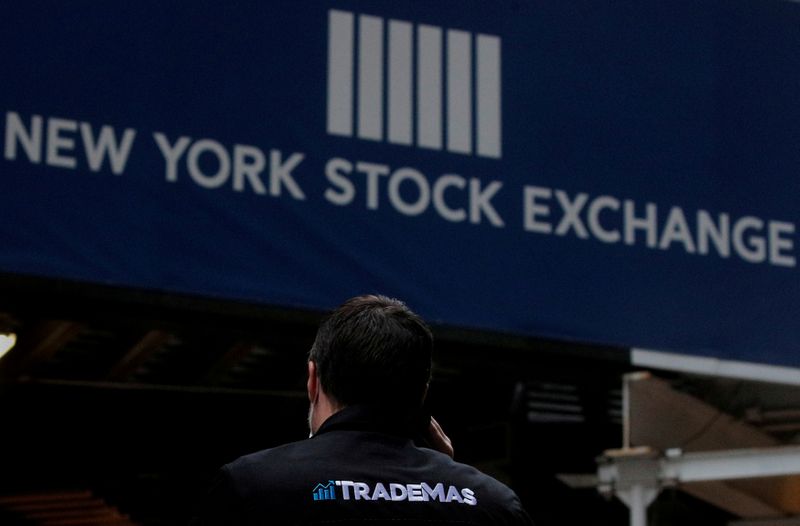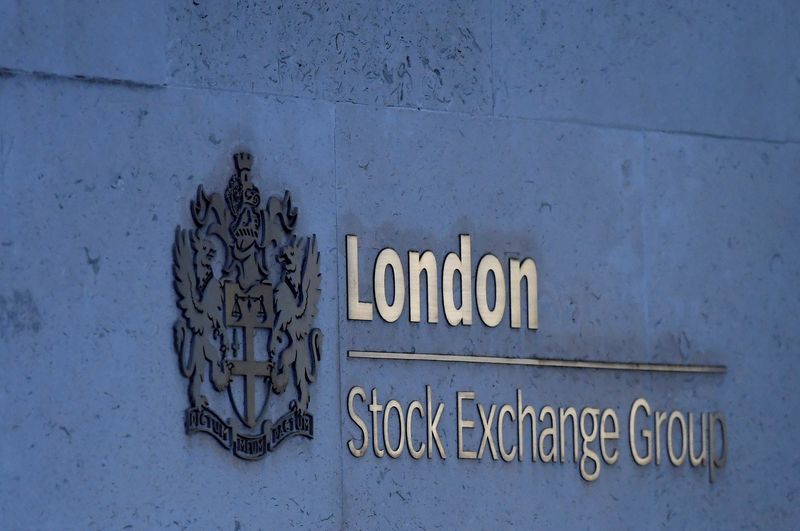NEW YORK (Reuters) – Wall Street fell on Wednesday as investors sold off technology stocks, while shares from Asia to Europe were flat, while the dollar rose even as U.S. jobs data disappointed investors and virtual curreny bitcoin jumped.
The pan-European STOXX 600 index rose 0.05% and MSCI’s gauge of stocks across the globe shed 0.68%.
“We’re seeing a lot of what we’ve seen over the past week or so, that is markets being stymied to some extent by rising interest rates,” said Randy Frederick, vice president of trading and derivatives for Charles Schwab in Austin, Texas.
The Dow Jones Industrial Average fell 119.98 points, or 0.38%, to 31,271.54, the S&P 500 lost 50.51 points, or 1.31%, to 3,819.78 and the Nasdaq Composite dropped 361.04 points, or 2.7%, to 12,997.75.
Equities retreated as benchmark U.S. Treasury yields moved higher after declining for three straight days.
High-flying technology shares sold off as investors pivoted to sectors more likely to benefit as the economy recovers due to fiscal stimulus and vaccinations.
Emerging market stocks rose 1.30%. MSCI’s broadest index of Asia-Pacific shares outside Japan closed 1.42% higher, while Japan’s Nikkei rose 0.51%.
The U.S. economy’s modest recovery continued over the first weeks of this year, with businesses optimistic and housing demand “robust,” with slow improvement in the job market, the Federal Reserve reported.
Other data showed U.S. services industry activity unexpectedly slowed in February due to winter storms, while private payrolls increased less than expected as manufacturing and construction jobs declined.
Investors were growing optimistic that U.S. stimulus will soon energize the global economy. The U.S. Senate was set to open debate on President Joe Biden’s $1.9 trillion coronavirus relief package, with Democrats eager to pass it soon.
UK Finance minister Rishi Sunak delivered what he hopes will be a last big spending splurge to get Britain’s economy through the COVID-19 crisis, and announced a corporate tax hike starting in 2023 to bolster public finances.
Longer-term U.S. Treasury yields rose as investors looked toward comments from Federal Reserve Chair Jerome Powell on Thursday for signs the central bank was set to acknowledge the risk of a rapid rise in rates.
The benchmark 10-year note was poised to snap a three-day streak of declines following a jump to a one-year high of 1.614 percent last week, with many Fed officials having downplayed the rise in recent days.
Benchmark 10-year notes last fell 15/32 in price to yield 1.467%, from 1.415% late on Wednesday.
Euro zone government bond yields rose again on doubts about whether the bloc’s central bank will step in to curb the recent sharp increase, while data reflected optimism about economic recovery.
Although yields have dipped from their highs, pressure remains, with Germany’s 10-year Bund yield, the benchmark for the region, rising 5 basis points to -0.29%. It remained far below its Feb. 26 spike of -0.203%.
The dollar gained as investors priced for strong U.S. growth relative to other regions, while the safe-haven Japanese yen continued to weaken to a seven-month low.
The dollar index rose 0.157%, with the euro down 0.21% to $1.2064.
Bitcoin hit $52,652, the highest in a week. It was last up 4.1% at $50,533.
Spot gold dropped 1.3% to $1,715.40 an ounce. U.S. gold futures fell 0.85% to $1,715.30 an ounce.
Oil prices rose, boosted by expectations that OPEC+ producers might decide against increasing output.
U.S. crude recently rose 2.44% to $61.21 per barrel and Brent was at $64.04, up 2.14% on the day.fell 0.85
(Reporting by Suzanne Barlyn; Editing by David Gregorio)
























